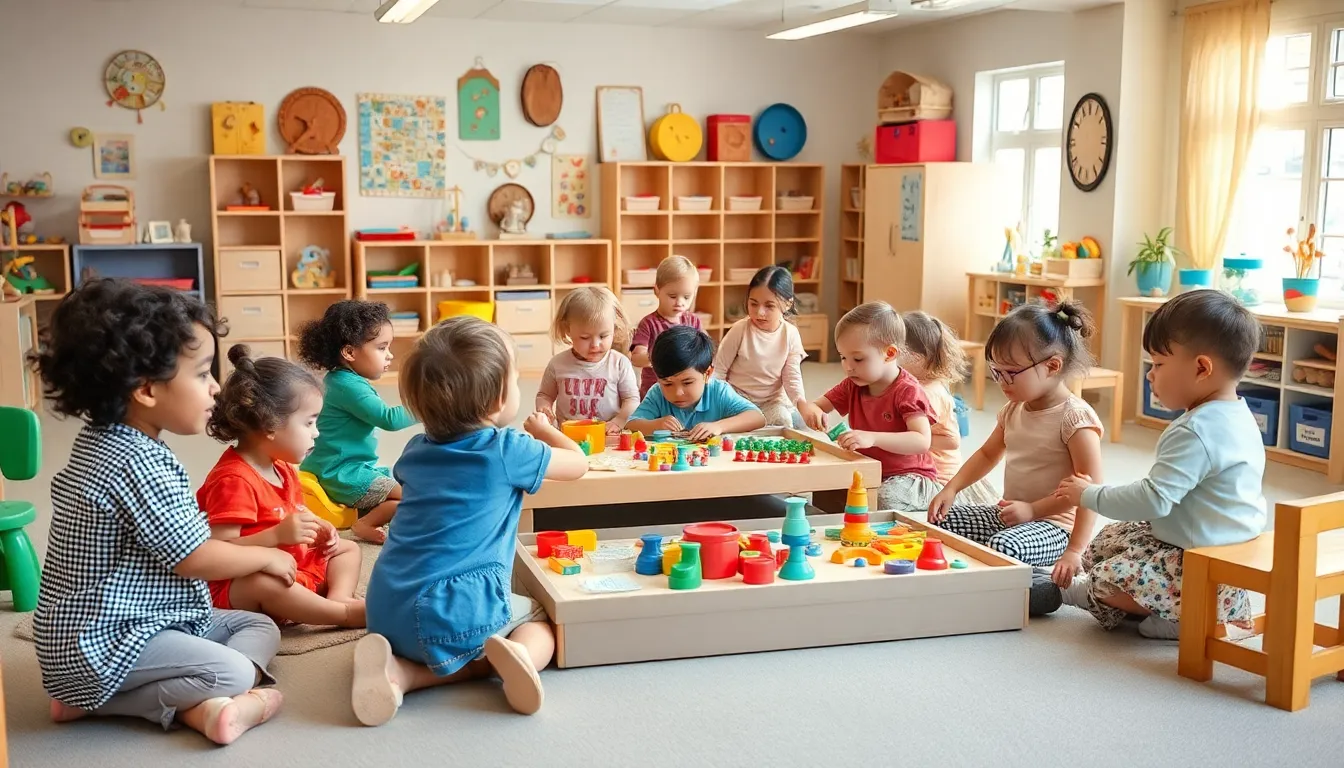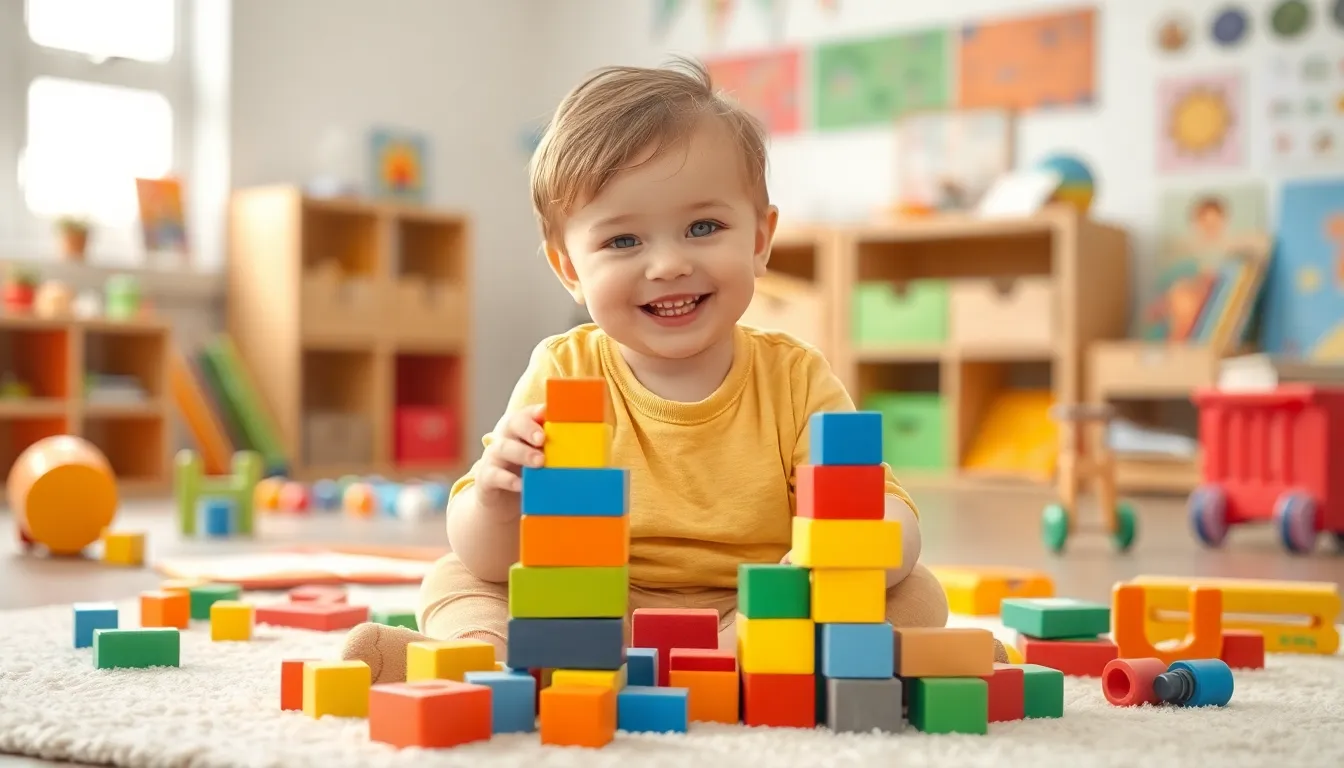In a world where toddlers seem to have more energy than a double shot of espresso, finding the right programs can feel like searching for a needle in a haystack. But fear not! Toddler programs are designed to channel that boundless enthusiasm into fun and learning, making both kids and parents rejoice.
Table of Contents
ToggleWhat Are Toddler Programs?
Toddler programs focus on fostering growth in young children through structured play and learning. These initiatives cater to children aged one to three, ensuring they engage in age-appropriate activities that stimulate development.
Definition and Purpose
Toddler programs serve as organized efforts to enhance physical, social, and cognitive skills. Educators design these programs to create a dynamic atmosphere featuring creative expression and exploration. Learning through play becomes the hallmark of these activities. Programs often include storytelling, music, and sensory experiences, which engage toddlers while fostering language development. Parents benefit by observing their child’s growth and enjoying shared learning moments.
Importance of Early Childhood Education
Early childhood education establishes a foundational framework for lifelong learning. Research indicates that quality toddler programs contribute significantly to social and emotional development. Participation helps develop language and communication skills that prove essential later on. Cognitive abilities also receive an early boost through problem-solving activities and interactive play. Parents notice increased confidence and curiosity in their toddlers, showcasing the program’s lasting impact on a child’s growth trajectory.
Types of Toddler Programs

Various toddler programs cater to the diverse needs of young children. These programs aim to support development through engaging and age-appropriate activities. Below are some popular types of toddler programs.
Play-Based Learning Programs
Play-based learning programs focus on child-directed play to foster creativity and exploration. Children engage with peers in hands-on activities that encourage problem-solving and critical thinking. The environment often includes interactive toys and materials designed to stimulate curiosity. Educators observe and guide rather than direct play, promoting independence. Social skills flourish as toddlers learn to share and collaborate during group activities. Parents appreciate the emphasis on fun, as children remain excited and engaged while learning effectively.
Montessori-Based Programs
Montessori-based programs utilize a child-centered approach, emphasizing independence and respect for a child’s natural development. Structured environments allow toddlers to choose their activities from a range of options, promoting self-directed learning. Trained educators guide children in personalized ways, addressing various developmental needs efficiently. Careful observation helps educators tailor experiences to each child’s interests, fostering a love for learning. The focus on hands-on activities supports fine motor skills and cognitive growth, preparing children for future educational success.
Language Development Programs
Language development programs prioritize communication skills through interactive activities and storytelling. Curriculums often include songs, rhymes, and games that enhance vocabulary and early literacy. Educators encourage toddlers to express themselves verbally, fostering confidence in communication. Small group settings promote social interaction, reinforcing language acquisition through peer engagement. Caregivers witness significant improvements in language and listening skills, laying a strong foundation for future literacy. These programs cater specifically to nurturing early expression and comprehension skills.
Benefits of Toddler Programs
Toddler programs offer significant advantages that contribute to a child’s overall development. These structured initiatives target various growth areas for children aged one to three.
Social Skills Development
Social skills flourish in toddler programs. Children interact with peers, learning to share and cooperate. Building friendships becomes easier through engaging group activities. Practicing conversation skills allows toddlers to express their feelings and thoughts. Exposure to diverse social environments enhances empathy and understanding. Parents notice improved interactions at home, showcasing the program’s impact on social behavior.
Cognitive Growth
Cognitive growth thrives through structured learning experiences in toddler programs. Engaging activities stimulate curiosity and encourage exploration. Hands-on play fosters problem-solving and critical thinking abilities. Toddlers develop language skills in interactive settings, boosting vocabulary through storytelling. Additionally, memory games enhance recall and attention spans. Parents observe a marked increase in their child’s willingness to learn, reinforcing the importance of early educational experiences.
Emotional and Behavioral Benefits
Emotional and behavioral benefits manifest in participants of toddler programs. Children gain confidence as they navigate new situations and challenges. Supportive environments teach toddlers to manage emotions and recognize feelings in others. Reducing anxiety becomes easier through familiarity with routines and structure. Self-regulation skills develop as children learn to cope with frustrations during play. Parents appreciate the positive changes in behavior, noting increased resilience and adaptability.
How to Choose the Right Program
Selecting the right toddler program requires careful consideration. Parents must evaluate various aspects to ensure an optimal fit for their child’s needs.
Factors to Consider
Evaluate age-appropriate activities that align with developmental stages. Ensure the program focuses on physical, social, and cognitive skills. Assess the teaching methods employed. Play-based and Montessori approaches cater to different learning styles, enhancing engagement. Look into class sizes; smaller groups promote individual attention and foster social interaction. Investigate the qualifications of instructors to confirm they possess necessary training in early childhood education. Consider location and schedule flexibility. Programs should be accessible and convenient for parents.
Questions to Ask
Inquire about the daily structure; understanding routines helps assess their suitability. Ask how the program supports emotional and behavioral development, as these aspects contribute significantly to early growth. Seek information on communication strategies used to promote language skills, including reading and storytelling activities. Explore ways parents receive feedback regarding their child’s progress; consistent updates provide insight into developmental milestones. Discuss safety measures in place, ensuring a secure environment for toddlers. Confirm whether they offer opportunities for family involvement, fostering community connections and enhancing the educational experience.
Choosing the right toddler program can significantly shape a child’s early development. These programs not only channel a toddler’s energy into constructive activities but also build essential skills that set the stage for future learning. As children engage in play-based, Montessori, or language-focused activities, they develop social, emotional, and cognitive abilities that last a lifetime.
Parents who invest time in selecting a suitable program often witness remarkable growth in their toddlers. The right environment fosters curiosity and confidence while promoting healthy interactions with peers. Ultimately, a well-structured toddler program is a vital step in nurturing a child’s potential and ensuring a bright future.



